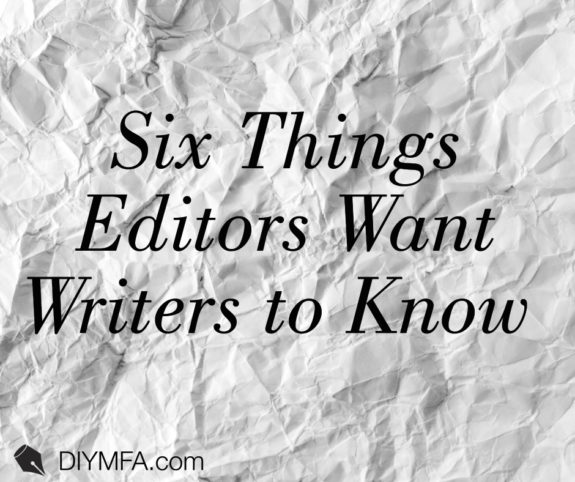The typical idea of an Ask the Editor column is for you (a writer) to ask me (an editor) questions, which I then explain as larger concepts for the benefit of other writers. But without your questions, I’m stuck picking my own topics—a dangerous thing. This month, I decided to flip the meaning of this column, and I asked a bunch of other editors what they wished writers knew about the editing process and working with a professional editor. So, here it is—the top six things editors wish writers knew more about.
Self-Editing
Believe me, editors are thrilled when writers realize that they need professional editing. But finishing your first draft does not mean it’s time to start looking for an editor. Every writer needs some level of self-editing before submitting their work. Copious errors distract editors from getting to the heart of your writing and some editors may charge more when they see how much work is needed. A clean manuscript will ensure you’re getting the biggest bang for your buck and the best edits possible.
Editor/Writer Relationship
Not every editor and writer were meant to work together. It’s important to research and reach out to several editors to find the right fit. Look for people knowledgeable in your genre and be sure that person can meet your timeline and budget. Clear and honest communication before, during, and after is critical to working well with your chosen editor.
Length of the Editing Process
The editing process has multiple steps and each step requires multiple pass-throughs of your manuscript. It may take several months to receive your edits back, and the entire editing process can last over a year (or even several). That’s not to say you’ll be old and grey before your manuscript is polished. But the editing process can’t be rushed. Be patient. We’ll get there.
Feedback from Editors
We editors are not here to crush your dreams or overwrite your voice. We are here to make your writing the best it can possibly be. Will that require critical feedback? Certainly. But every suggested edit is intended to lead you to a better story. We want to see you succeed. Always keep this in mind when receiving editor feedback.
Post-Edit Review
Editors are not here to simply change your work for you and that’s the end of it. Edits are suggestions and the changes are tracked throughout the document so you can easily see what was modified. It is the writer’s responsibility to go through the manuscript post-editing and either accept or reject the changes. If you’re unsure how to do this, ask your editor for a quick tutorial.
Editing Investment
Professional editors work hard to help make your writing shine and they should be paid fairly for their work. Editing is an investment. If you’re looking for bargain-basement pricing, you’ll end up with low-quality editing to match. When you invest in quality editing, you have a much higher chance of seeing a return.
How to “Ask the Editor”
Have a burning question for the editor? Just ask!
Jeanette is always accepting questions for our Ask the Editor column. Send a few paragraphs introducing yourself and your question to Jeanette@DIYMFA.com. You can also send up to five pages of your WIP for critique. We do our best to answer every question we receive, so keep an eye out for our next Ask the Editor article. Your question may be featured!

Jeanette the Writer is an editor, coach, and freelance writer who wants to help others demolish their editing fears and finish their manuscript. As a former scuba instructor turned entrepreneur, Jeanette knows about putting in the hard work to pursue your passions. She has worked with authors, speakers, coaches, and entrepreneurs—empowering them with the right mindset, knowledge, and tools to help them tackle their editing goals. You can learn more about Jeanette by visiting JeanetteTheWriter.com.







